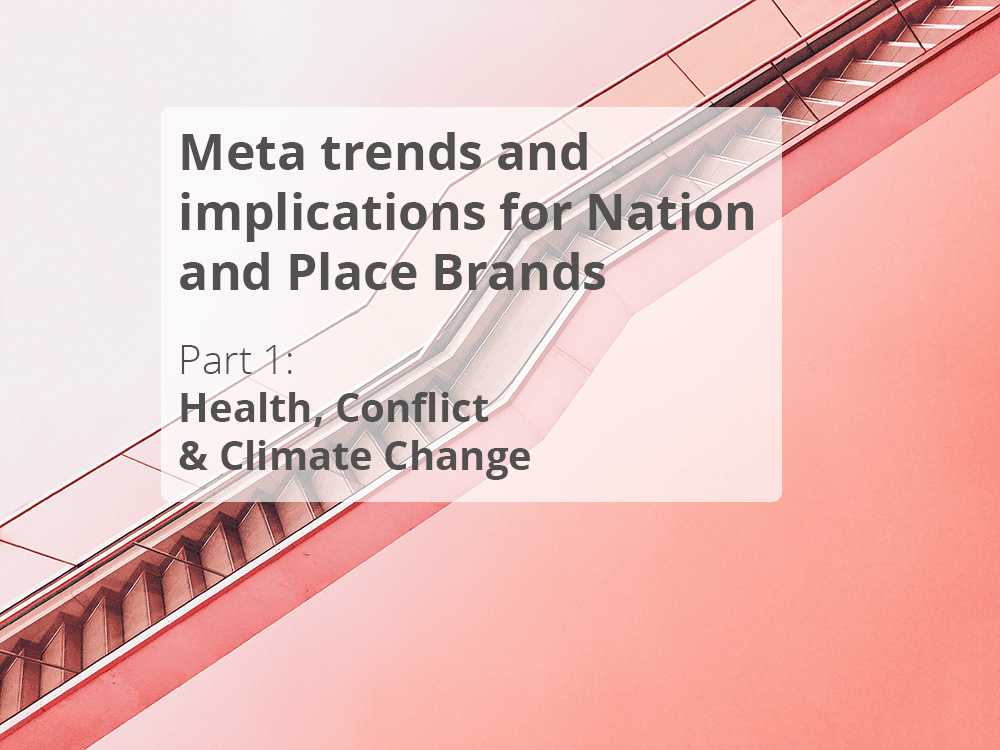Part 1: Health, Conflict & Climate Change
Introduction
The following meta trends and their implications on Nation and Place Brands are the predictions of Bloom Consulting after having performed independent research and analysis on future studies. We will uniquely present each meta trend with its corresponding implication for Nation and Place Brands with points of reference as well as recommendations for impact mediation and getting ahead.
Among the sources used to make the following predictions were the Global Trends to 2030 – Challenges and Choices for Europe by the European Strategy and Policy Analysis System, Global Trends 2030: Alternative Worlds a publication of the National Intelligence Council, and reports published by the National Foresight Network as part of Finland’s Prime Minister’s Office, and 21 Lessons for the 21st Century by Yuval Noah Harari.
The seven meta trends decided and assessed throughout our research are the following:
1) Conflict
2) Climate Change
3) Health
4) Government
5) Economy
6) Migration
7) Pandemic
The eighth and enigmatic meta trend explored is yet to be discovered. It is now, and will be, the next big thing.
In summation, we’ve concluded the following positions for each meta trend in relation to one another based on two axes, tangibility (X) and relevance (Y).
Graph 1. Meta trends: tangibility and relevance.
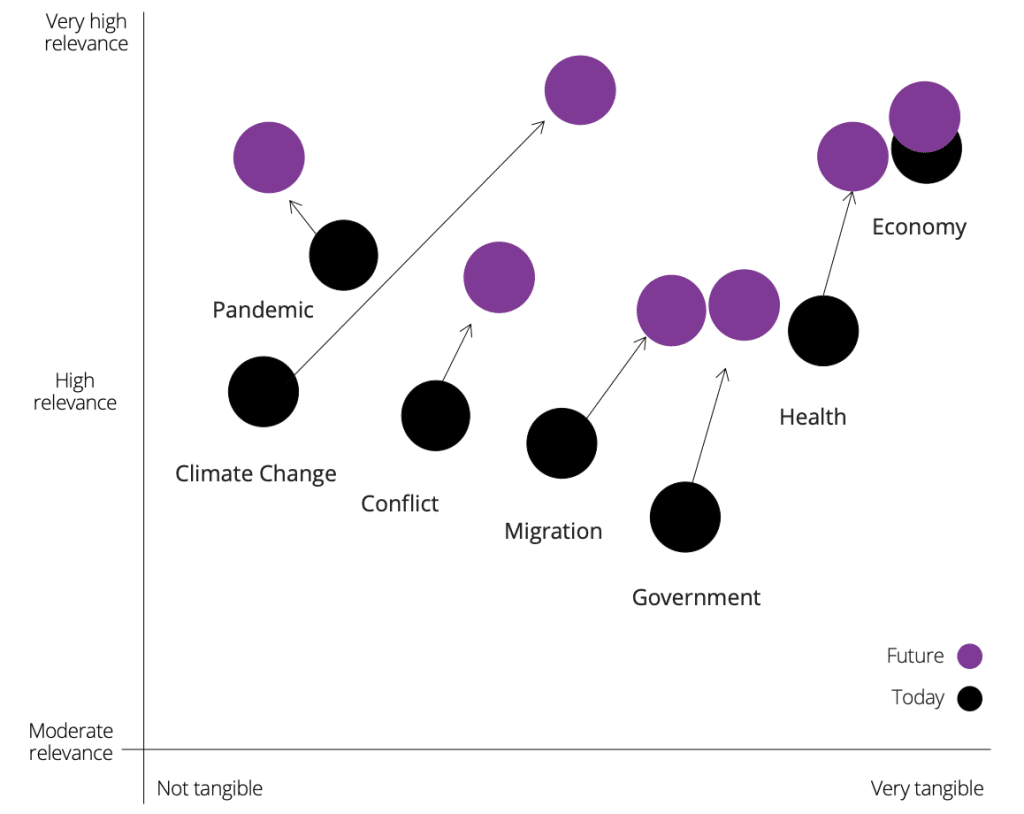
Meta Trend 1
Conflict
As we’ve seen throughout history, interstate conflict has greatly influenced global development and international relationships. Here we are looking more closely at the rising issue of conflict within states. Digitalization has driven this development as increasing sources of information become available and unregulated social media continues to prompt widespread mistruths and misinformation. Rapid changes and the growth of digitalization paired with shifts in power such as national elections and rising and/or falling economies are driving tensions between groups, pertaining to a range of issues from social acceptance to environmental protection efforts. Rising tensions do not always result in physical violence. As we have seen in the United States for example, the nation underwent one of its greatest divisions in social and political groupings during COVID-19, whether directly or indirectly related, as it corresponded with the presidential election, Black Lives Matter, and of course, COVID-19 response and crisis management.
- Digitalization and the spread of (mis)information
- Increased group tensions
- Intrastate conflict
Implication for Nation and Place Brands
Intra and interstate conflicts alike will affect the appeal and attraction of nations and places whether country, region, or city. In addressing brand audiences’ need states, we can most easily pinpoint safety as an area of focus in this case. Nations and places that enact policy, react quickly, and address conflict in a timely, transparent, and just manner while listening to citizens will help to counter the spread of misinformation and enhance perceptions of a country, region, or city that works with its constituents to find dynamic solutions, creating an environment that enables its people to collaborate and coexist rather than compete or condemn. There is an added responsibility being placed on national, regional, and city government systems to foster a sense of cooperation and promote constructive, open dialogue, with the ultimate objective of mediating intrastate conflict through “domestic diplomacy”.
- Be mindful of brand audiences’ perceptions of safety and security
- Foster a sense of cooperation and promote constructive, open dialogue
- Implement “domestic diplomacy” and solution-oriented platforms
The dimensions most affected by this meta trend are Nation and Place Brand appeal for:
- Investment
- Talent
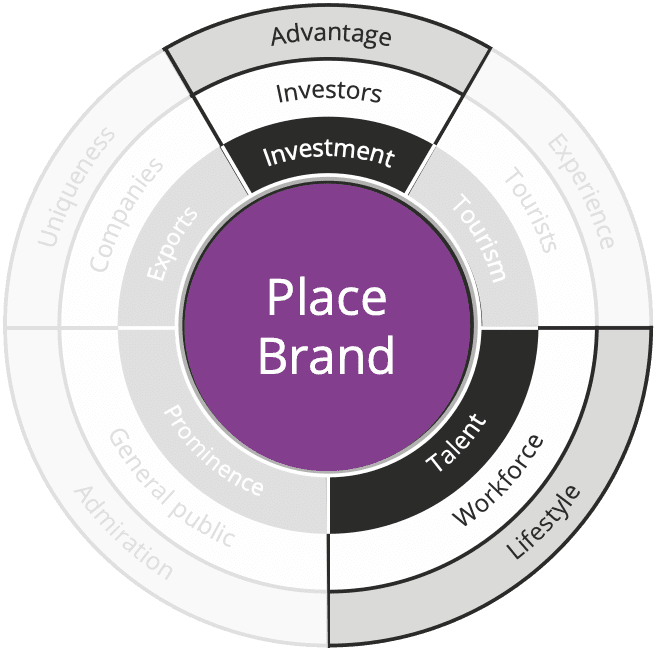
Meta Trend 2
Climate Change
Climate change affects our nature, livelihoods, settlements, investment, and tourism amongst other direct and indirect points of alarm for international citizens and our environment. That said, the climate emergency is expected to sharply steepen in terms of tangibility as it will only continue to be more intensely felt by the global civilization. With an increase in tangibility, it will only be more so covered in the media and debated amongst constituents in terms of actionable solutions. In this case, consequences include food security and prices, disease, land and sea, migration, and an ongoing list of at-risk groups. However, purchasing power and geography will play a major role in level of impact.
- Business, travel, and lifestyle will be greatly affected as the climate emergency steepens
- Tangible consequences will be increasingly felt across global audiences
- Climate change will have different levels of intensity for different socio-economic and geographic groups
Implication for Nation and Place Brands
Global outlook and comprehension are necessary to successfully guide and develop Nation and Place Brand strategies, all while maintaining a local focus, to develop big picture solutions and reverse the harmful effects of climate change. Countries, regions, and cities that prioritize the climate emergency as part of their agenda and strategic objectives will integrate sustainable and thoughtful brand values and actions for the benefit of global and local communities as well as posterity. Costa Rica has curated its Nation Brand, Essential Costa Rica, to accommodate and target objectives geared towards sustainability and the climate emergency, using these platforms as drivers for on-brand touchpoints. Global audiences are demanding change and those who are first to do so will win. Denying the climate emergency from a Nation and Place Brand perspective will hurt the country, region, or city and its people, while tackling it will conversely help.
Two nations that took the initiative, and risk, to mitigate environmental impacts and climate change are Palau and the Faroe Islands. The Palau Pledge requires visitors to sign their passport, declaring they will “…act in an ecologically and culturally responsible way on the island, for the sake of Palau’s children and future generations of Palauans…”, resulting in 498,110 pledges being taken thus far. Another island nation across the globe declared closed for maintenance, open for voluntourism, an initiative resulting in thousands of applications to be part of the Maintenance Crew in the Faroe Islands. This is an opportunity to lead the conversation and build positive perceptions within those who resonate with the need states being addressed in tackling this meta trend.
- Keep pace with the demands of global audiences who consider the climate emergency as a factor for Nation and Place Brand appeal and attraction
- Get creative, take risks, and join leaders in drumming up positive media attention for actionable measures
- Be among the first to act and implement it into your Nation and Place Brand strategy, or else fall behind
The dimensions most affected by this meta trend are nation and place brand appeal for:
- Tourism
- Talent
- Prominence
- Exports
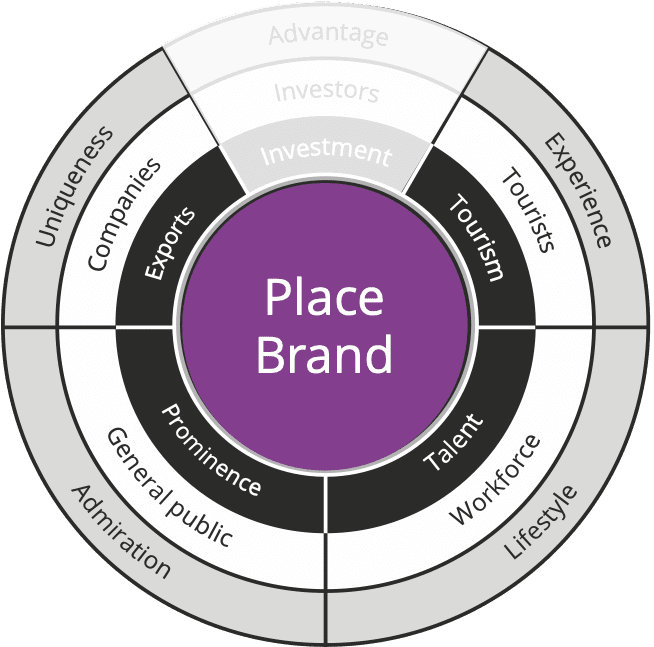
Meta Trend 3
Health
COVID-19 accelerated this meta trend, giving it a platform to speak from and driving awareness due to extraordinary circumstances such as lockdown. As discussions on the subject continue to rise, there will be a shift in priority, necessitating new and/or updated public policy. To that end, data, digitalization, and personalization of health-related products and services will have a major role to play whether being offered by the private or public sector while need states rise to the surface and civilization demands new solutions with the tools aptly available. To have a chance, mental and physical health will be dependent on education, accessibility of products and services, and personalized solutions through data-driven insights.
- Individuals and societies are becoming more aware and risk-averse regarding mental and physical health
- With a raise in awareness, the public and private sectors are being challenged to step up and make a change
- Data, digitalization, and personalization will shift the product and service offer within the health meta trend
Implication for Nation and Place Brands
Nations and places are perceived to have certain levels of healthcare available. Whether accurate or not, and this affects willingness to visit, live, work and/or study amongst other priorities of brand audiences. Public policy and its efforts to aid local and global citizens in the search for affordable, quality healthcare is beyond a unique value offer and moreover a basic need of nations and places hoping to attract brand audiences with a certain level of mobility and purchasing power.
New Zealand has taken the initiative to approve bereavement leave after a miscarriage or stillbirth for women and their partners, as well as utilizing the Mental Health Foundation of New Zealand for policy advisement. These executive decisions are only one example of a nation that is paving the way towards mental and physical health awareness and appreciation from a holistic perspective, truly taking care of its people and workforce. Nations and places must see policy for mental and physical health as an investment rather than an expense. “Healthier” countries, regions, or cities will be perceived as more desirable by global audiences, and thus benefit in one way or another.
- Prioritize healthcare as it relates to the global and local dimensions being affected
- Implement policy to ensure quality and affordable mental and physical health tools and support
- Be a leader by enacting innovative and effective policies and institutions to support national health improvement
The dimensions most affected by this meta trend are nation and place brand appeal for:
- Tourism
- Talent
- Prominence
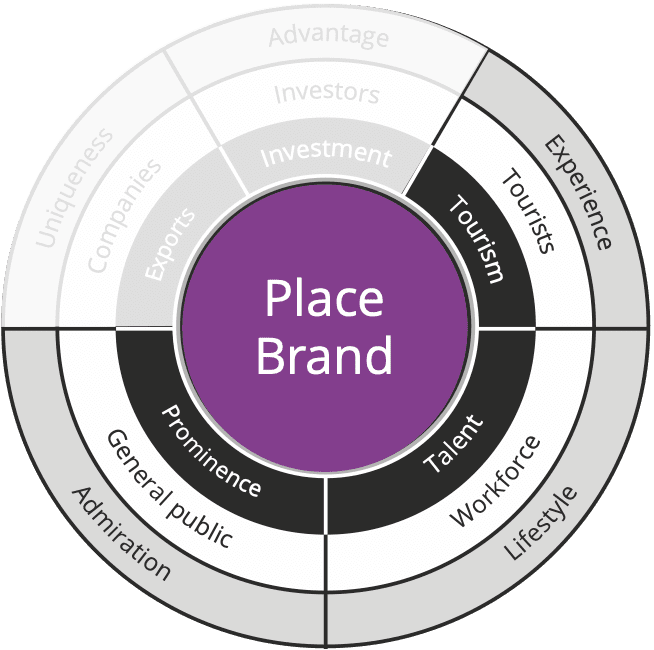
This is the first edition of a three-part series. We look forward to sharing the following meta trends in the second edition: government, economy, and migration.
Part 2: Economy, Migration & Government
Part 3: Pandemic & the next big thing
To view and download the final report, click here
Published on 21.05.2021.





